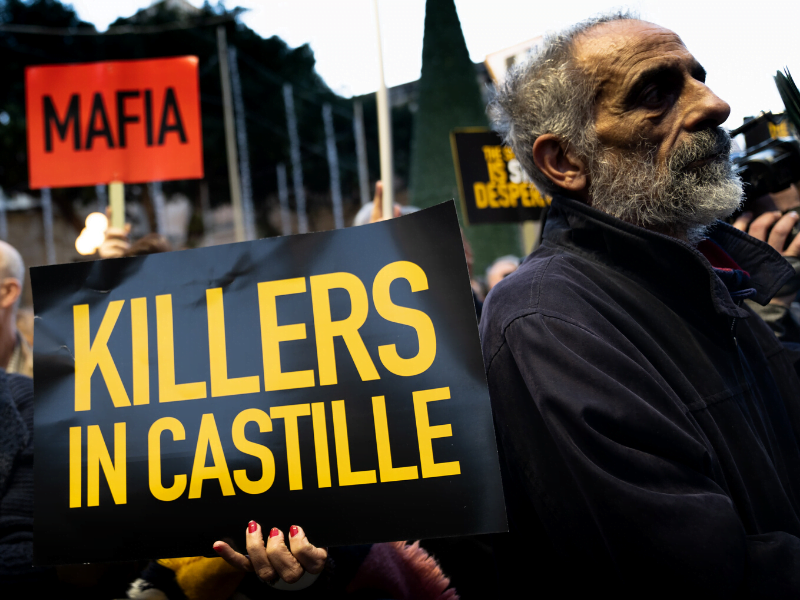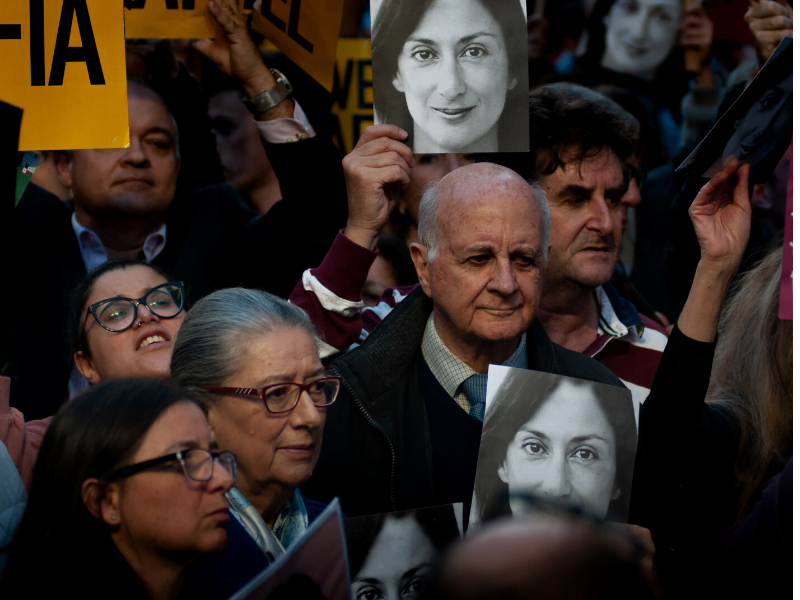As each testimony in the ongoing court trial on the murder of journalist Daphne Caruana Galizia reveals another deeper, more intricate twist in the assassination plot involving some of Malta’s highest officials, her family is left to mark the anniversary of another month of her death without any concrete answers.
And these links connecting her assassination to the country’s highest office are being further exposed with each court sitting in the compilation of evidence of Yorgen Fenech, who has been charged with acting as the mastermind behind the murder, adding another piece to the picture where everything seems to connect to the Labour government.
Exactly 32 months ago today, on 16 October 2017, Caruana Galizia left her Bidnija home just after 3pm and died soon after, when a bomb placed under her rental car detonated a few metres away from her home. Her family has been at the forefront in the fight for justice every day since her death, as layer after layer exposes the rot at the core of the country’s governance.
The court sittings were put on hold since March due to the coronavirus pandemic and resumed last week as the prosecution played hours of secret recordings made by Melvin Theuma, the man who acted as the middleman in her assassination, and his conversations with Fenech. Throughout the quarantine measures, Fenech filed several court applications, claiming that his rights were breached by being kept under preventative detention while the court was closed.
One name constantly comes up, especially in the testimony of Theuma, who was granted a presidential pardon in return for his collaboration with the police – that of former chief of staff Keith Schembri.

Calls for justice and resignations made by citizens in protests held almost daily in late 2019 led to only a superficial change in leadership that ensured ‘continuity’. Photo: Pierre Ellul
Theuma was not the only one to refer to Schembri. On Monday, Johann Cremona, Fenech’s business associate, told the court that Schembri had called him up – two months before Fenech’s arrest – and told him to tell Fenech to get in touch as he could not reach him.
Schembri then called him to his office at Castille, saying he was worried that Fenech was going through a difficult time and, after that, got in touch a few times to tell him to speak to Fenech.
Cremona’s testimony links in with other mentions of the former chief of staff also made by Theuma who started panicking because he was scared of being ratted out by the Degiorgio brothers, who are being charged with planting the bomb that killed the journalist. Theuma told Cremona that he felt betrayed by Schembri and Fenech.
The details that have emerged so far in the case also give a clear indication of the comfort Fenech felt at that point in time before the assassination, as well as the intense fear that gripped Theuma after it happened.
Theuma told the court how Fenech felt safe with the Labour government in power and had even sent him a message with the details of a pre-election survey showing Labour in the lead. “If Labour retained power, they would be OK. That is what was implied by that message,” he told the court.
In fact, Theuma is claiming that Fenech was receiving information updates about the murder investigation from Schembri.
‘True men’ don’t pay for a woman to be murdered, nor say how they would throw / would have thrown her 21 stories off Portomaso Tower.#YorgenFenech #MelvinTheuma #DaphneCaruanaGalizia #JusticeForDaphne pic.twitter.com/rzJLbuwPeL
— Mandy Mallia (@MandyMallia) June 14, 2020
The recordings also reveal the men’s deep-seated hatred towards the journalist. Although Theuma never spoke to the former chief of staff, at one point Fenech told him that Schembri would have burnt Caruana Galizia if he could when she had reported that he was fatally ill.
Fenech himself can be heard threatening to throw her off the Portomaso Tower – a statement that was called out by Caruana Galizia’s sister Mandy Mallia.
Although the court sittings form part of her murder trial and each revelation brings new waves of shock, the hearings themselves dehumanise Caruana Galizia. Daphne as a person, as a woman, is buried beneath gruesome details of men in power plotting a brutal killing to silence her work.
In an interview with La Via Libera, an Italian publication that investigates the Mafia and corruption, her sister Corinne Vella pointed out that there was so much more to Caruana Galizia than her articles.
“Few know that, as she was writing and breaking these stories, she lived a normal life in her beautiful house, surrounded by family and friends. She loved gardening, art, literature and worked on her magazine ‘Taste & Flaire’, which is all about food, art, culture, interior design and we still publish to this day. This side to her was hidden by those she called out – with the sole purpose of discrediting her,” Vella said.
I sat there and listened to this astonishing evidence of state complicity in my mother's murder, and watched as… absolutely nothing happened. No order to investigate was given. The next hearing was scheduled and the magistrate calmly walked out of the room. That was it. https://t.co/iJqTN3GUFq
— Matthew Caruana Galizia (@mcaruanagalizia) June 1, 2020
In an unexpected twist just as Tuesday’s marathon of testimonies was almost over, presiding Magistrate Rachel Montebello ordered the police to investigate former police commissioner Lawrence Cutajar after Theuma testified that he had received information from Cutajar over ongoing investigations into money laundering.
Last week, Theuma also named former economy minister Chris Cardona, saying that he gave one of the Degiorgio’s brothers money through a third party.
Prime Minister Robert Abela has urged the police to investigate “all corners” of the case against the four people who have been charged as well as any other necessary investigations. But the reality is that Abela should not need to urge the police to do their job; the police do not need to take orders from the Prime Minister but should be holding power in check.
If the police had done their job, rather than its top officers protecting corrupt officials and hindering investigations, we would not be in this situation. Abela knows this.
🌿 It's time. #DaphneCaruanaGalizia #32months #JusticeForDaphne pic.twitter.com/2928GehATI
— repubblika 🇲🇹 #JusticeForDaphne 🌿 (@repubblikaMT) June 16, 2020
The situation is surreal. Even now, we have key people in positions of power linked to the assassination or interfering with the investigation – Keith Schembri, Chris Cardona, Joseph Muscat (ix-xiħ), Lawrence Cutajar and his deputy Silvio Valletta – and no action has been taken.
The revelations should result in arrests, but not in Malta where people like former Economy Minister Cardona and Deputy Police Commissioner Valletta give interviews to the press as though this is a legitimate form of defence.
It is only the court that decides innocence or guilt, but the court cannot do that if the police fail to do their duty. Instead, with each new court hearing, we have more questions than answers.
This farce has dragged on for far too long.













